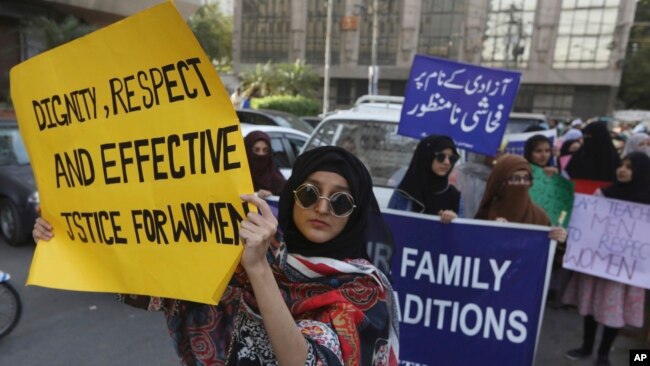世界における女性の地位
”いいね”の数が少なかったことに、残念な思いです。
JALのアナウンスでは、性差を取り払うようになったとニュースで聞きました。LGBTの観点からです。
しかし、ジェンダーは存在しています。
どちら側であろうと、何者であろうと。
ジェンダーが地位を狭くしてしまうのでしょうか。
経済循環ですか?戦争ですか?搾取ですか?利権ですか?
卑弥呼の国、日本があった時代がありました。
わたしのブログでは、政治や社会問題には深くかかわる気はありません。
ニュースとは、どうしても伝える者の主観があることは否めませんが。
書かれていることを伝える、それがこのブログ。
今日のVOAニュース、世界における女性の地位について。
- 国連女性会議から25年、平等は遠い目標のまま
- 25 Years After UN Women’s Meeting, Equality Remains Distant Goal
- Words in This Story
国連女性会議から25年、平等は遠い目標のまま
25 Years After UN Women’s Meeting, Equality Remains Distant Goal
October 01, 2020
25年前に世界の国々が一丸となって 人口の半分が残りの半分の権利、権力、認知を得られるようにしました。
それはまだ起きていません。そして、それはいつでもすぐには起こらないでしょう。
国連職員は、女性が男性と平等になるという希望は、まだ遠い目標であると述べています。
「ジェンダーの不平等は...私たちが直面している最大の人権上の課題です」とアントニオ・グテーレス国連事務総長は述べています。
同事務総長は先週のオンライン総会での演説の中で、COVID-19の危機が女性と女児を最も強く襲っていると述べています。
木曜日は、中国の北京で開催された1995年の国連女性会議から25周年を迎えました。会議では、189カ国が男女平等に関する150ページの合意を受け入れました。
記念日を記念するハイレベル会議の前に、国連女性機関のトップは、合意の目標に到達するための”ゆっくりとした、ひどく不均等な”進展を指摘しました。
国連女性事務局長のプムジール・ムランボン‐グッカ氏がAP通信に語りました。彼女は、北京会議以来、進展はあったが、利益は小さいと述べています。そして、「時として、それまでよりもはるかに大きな進展があったかのように錯覚することもあります」と。
国連女性事務局長 プンジル・ムランボン‐グッカ氏は、1995年には約11%だった立法府の女性の数が、今日では世界平均で25%にまで増加していることを指摘します。
また、世界では21人の女性大統領と女性首相がいますが、これは1995年のおよそ2倍です。
しかし、民間企業では、女性はいまだにハイレベルな役職に就いているのは23%に過ぎません。
全体では、世界で最も権力のある仕事の約75%を男性が占めていると、ムランボン‐グッカ氏は言います。彼らは”私たち全員のために意思決定をしている、それこそが私たちが打破しなければならないことなのです」と。
1995年に北京で開催された 世界女性会議 は、各国が男女平等への道筋に合意したことから、非常に重要なものでした。それは女性の公式な集まりとしては史上最大のものあったのです。しかし、北京宣言と行動綱領を承認した公式会議の17,000人の出席者の中には、何百人もの男性がいました。
その政策は、貧困やジェンダーに基づく暴力との戦いなど、女性と女児のための12の分野で強力な行動を求めました。他の分野では、すべての女子が教育を受けられるようにし、ビジネスや政府のトップレベルに女性を配置することが挙げられました。
その政策はまた、女性の人権には、”性と性と生殖に関する健康(reproductive health:妊娠・出産・避妊などについて、個人、特に女性みずからが決定権をもつという考え)に関する健康を含む性に関する事項”をコントロールし、決定する権利が含まれていると述べています。
ムランボン‐グッカ氏は、reproductive rights(リプロダクティブ・ライツ:性と生殖に関する健康とその権利に)関して大きな "後押し "があったと述べています。彼女は、米国を含む北半球の先進国は、その動きの一部であると。
「米国が後退すると、米国だけでなく、米国の動向に影響を受ける多くの人々にとっても大きなことになります 」と彼女は語ります。
欧州連合(EU)では、女性に対する暴力の防止と撃退に関する欧州評議会条約からの脱退を望む国もあると、ムランボン‐クカ氏は述べています。「EU内でそんなことが起こるとは予想もしていなかったでしょう」と彼女は言います。
そして、アフリカやアジアには、”前進するための圧力を感じていな”政府があると彼女は指摘しています。
1995年の北京会議での発言者の一人は、当時ファーストレディだったヒラリー・クリントン氏です。彼女の言葉は、世界の女性運動と密接に結びついてものでした。「人権は女性の権利であり、女性の権利は人権である」と。
最近、クリントン氏はジョージタウンの女性・平和・安全保障研究所で開催された北京会議25周年記念のオンライン討論会に参加しました。
「私たちにはやるべきことがたくさんあると思います 」とクリントン氏は語っています。「私は、時間を戻そうとしている権威主義的な指導者からの反発を心配しています。」
しかし、彼女はこう付け加えます 「それは、より多くのエネルギーを私に与えてくれているのです、私が声を上げ、他の人と協力し、最前線にいる人々を守るために」。
25 Years After UN Women’s Meeting, Equality Remains Distant Goal
 Pakistanis take part in a pro-women rally ahead of Women's Day in Karachi, Pakistan, Friday, March 6, 2020.
Pakistanis take part in a pro-women rally ahead of Women's Day in Karachi, Pakistan, Friday, March 6, 2020.
Twenty-five years ago, the nations of the world came together to make sure that half of its population gained the rights, power and recognition of the other half.
It has not happened yet. And it will not happen anytime soon.
United Nations officials say the hope of women gaining equality with men remains a distant goal.
“Gender inequality is…the biggest human rights challenge we face,” U.N. Secretary-General Antonio Guterres has said.
In a speech last week during the online General Assembly meetings, he said the COVID-19 crisis has hit women and girls the hardest.
Thursday marked the 25th anniversary of the 1995 U.N. women’s conference, which was held in Beijing, China. At the conference, 189 nations accepted a 150-page agreement on gender equality.
Before a high-level meeting to mark the anniversary, the head of the U.N. women’s agency noted “slow, terribly uneven” progress in reaching the goals of the agreement.
U.N. Women’s Executive Director Phumzile Mlambo-Ngcuka spoke with The Associated Press. She said there has been progress since the Beijing conference, but gains have been small. And, she said, “there is also sometimes...an illusion of much bigger progress than there has been.”
Mlambo-Ngcuka pointed to the number of women in legislatures, which grew from about 11 percent in 1995 to a worldwide average of 25 percent today.
There also are 21 female presidents and prime ministers worldwide -- about two times as many as in 1995.
But in private industries, women still hold just 23 percent of high-level offices.
In all, men still hold about 75 percent of the most powerful jobs in the world, Mlambo-Ngcuka said. They “make decisions for us all, and that is what we have to crack.”
The 1995 World Conference on Women in Beijing was critical because nations agreed on a path toward gender equality. It was the largest-ever official gathering of women. Yet hundreds of men were among the 17,000 attendees at the official meeting that approved the Beijing Declaration and Platform for Action.
The platform called for strong action in 12 areas for women and girls, such as fighting poverty and gender-based violence. Other areas were making sure that all girls get an education and putting women at top levels of business and government.
The platform also said that women’s human rights include the right to control and decide “on matters relating to their sexuality, including their sexual and reproductive health.”
Mlambo-Ngcuka said there has been a major “pushback” on reproductive rights. She said developed countries in the northern hemisphere, including the United States, are part of that movement.
“When the U.S. regresses, it is a big deal, not just for the U.S. but for many people who are influenced by trends in the U.S.,” she said.
In the European Union, Mlambo-Ngcuka said, some countries want to pull out of The Council of Europe Convention on preventing and fighting violence against women. “You would not have expected that to happen within the EU,” she said.
And in Africa and Asia, she noted, there are governments “that have not felt any pressure” to move forward.
One of the speakers at the 1995 Beijing conference was then first lady Hillary Clinton. Her words became closely connected to the worldwide women’s movement: “Human rights are women’s rights — and women’s rights are human rights.”
Recently, Clinton took part in an online discussion on the 25th anniversary of the Beijing conference at the Georgetown Institute For Women, Peace and Security.
“I think we have a lot of work to do,” Clinton said. “I’m worried about the pushback...that we see from authoritarian leaders, in particular, who are trying to turn the clock back."
But she added, “that just energizes me more to speak out, to work with others, to defend those who are on the front lines.”
_______________________________________________________________
Words in This Story
gender - n. the state of being male or female
challenge - n. a difficult task or problem : something that is hard to do
page - n. one side of a sheet of paper especially in a book, magazine, etc.
illusion - n. an incorrect idea : an idea that is based on something that is not true
crack - v. to find an answer or solution to (something)
regress - v. to return to an earlier and usually worse or less developed condition or state
trend - n. a general direction of change : a way of behaving, proceeding, etc., that is developing and becoming more common
authoritarian - adj. expecting or requiring people to obey rules or laws : not allowing personal freedom